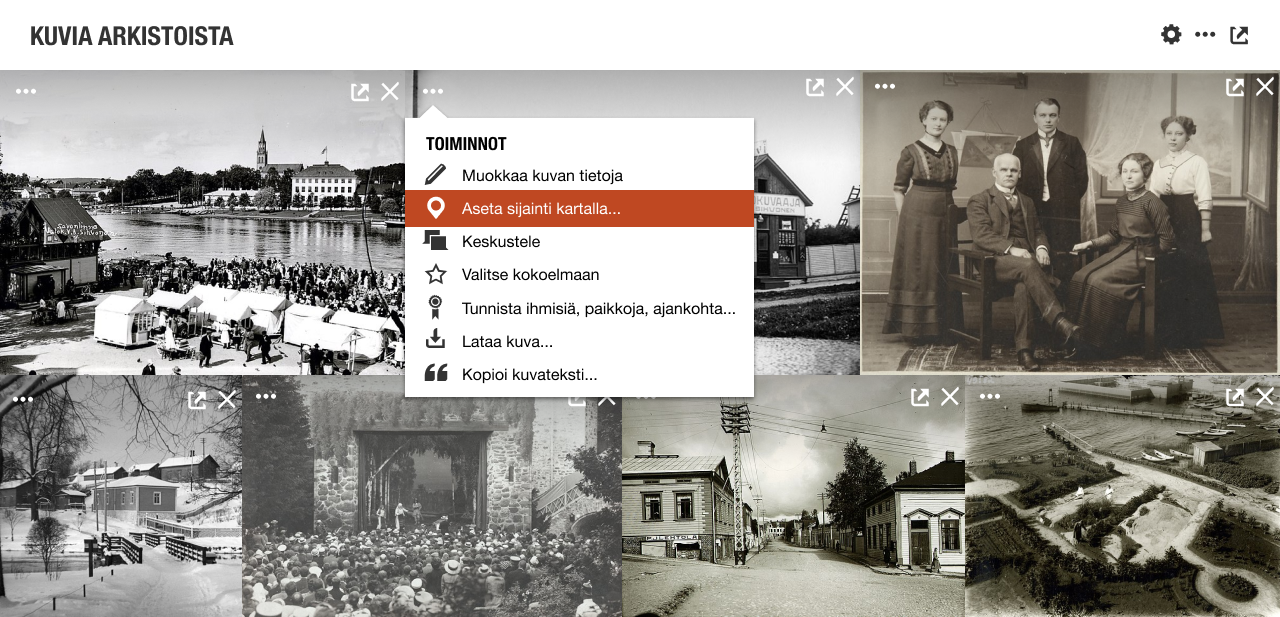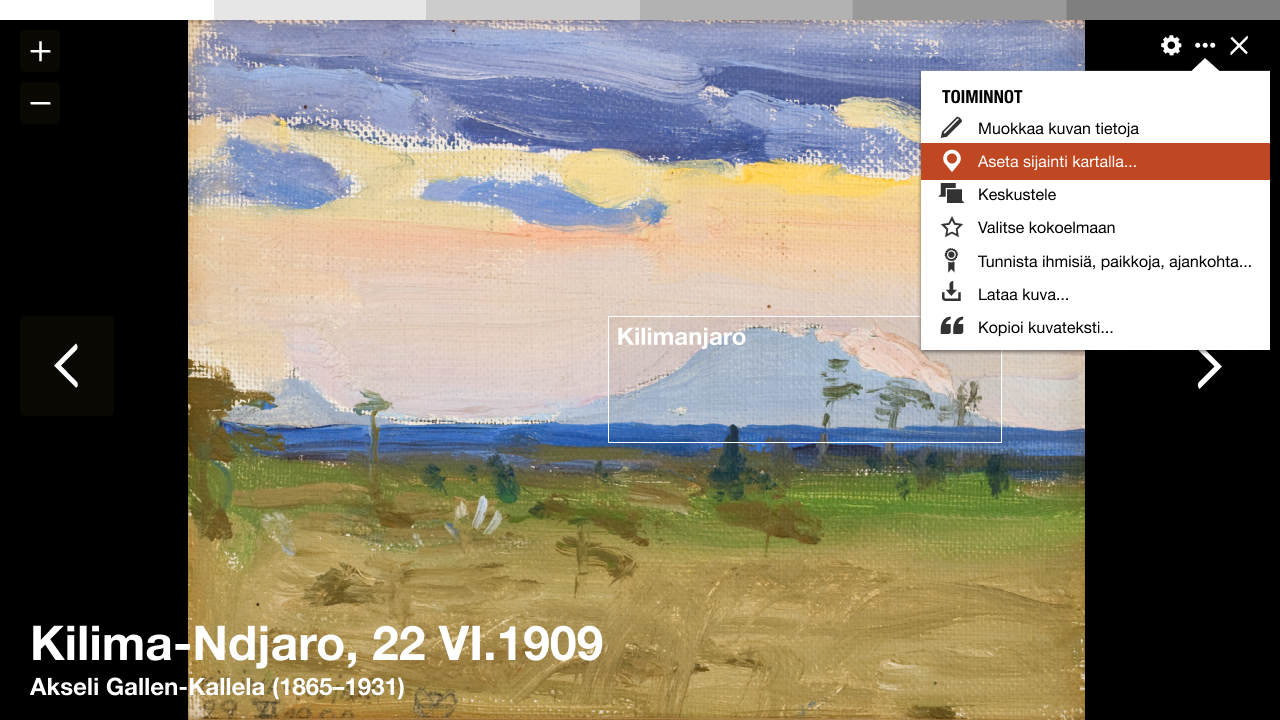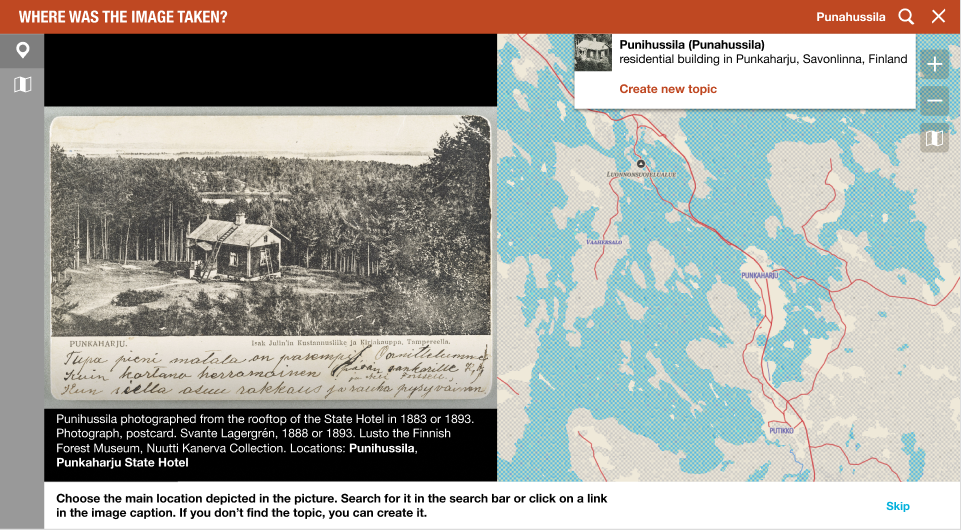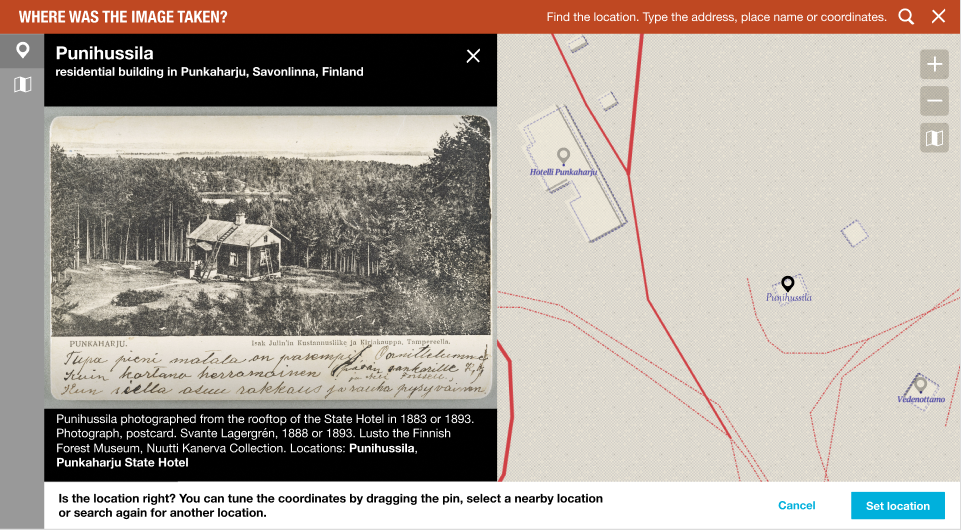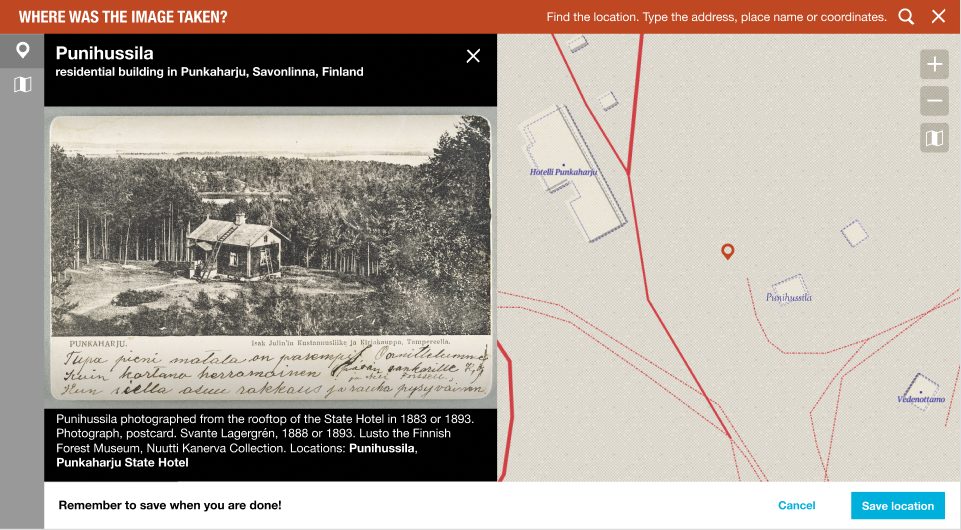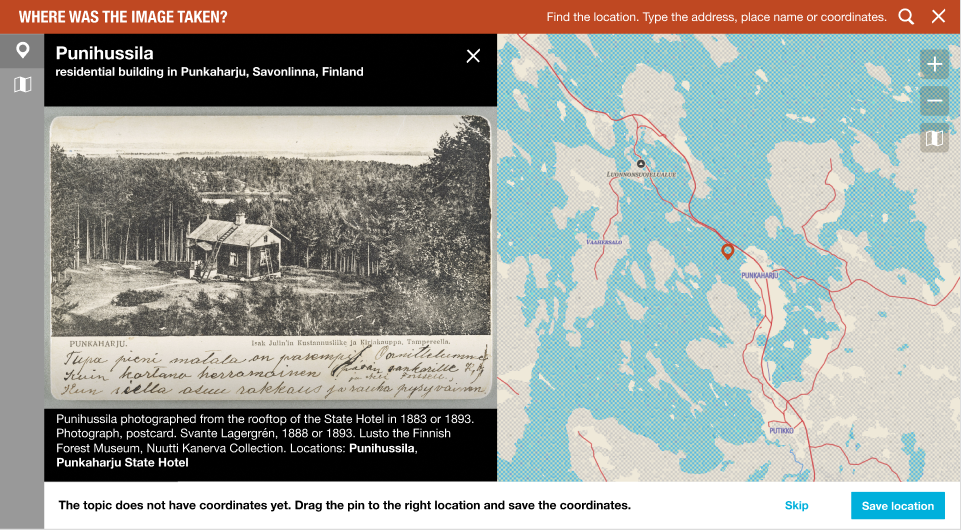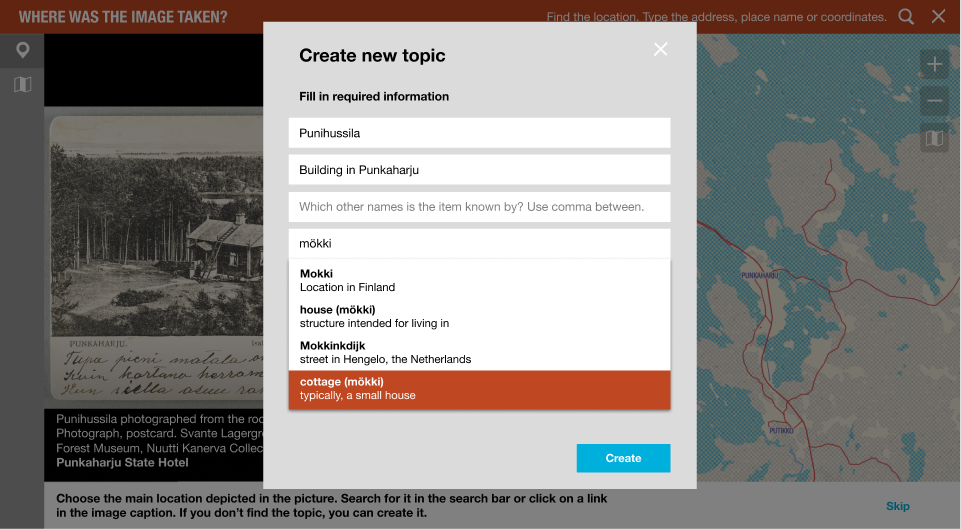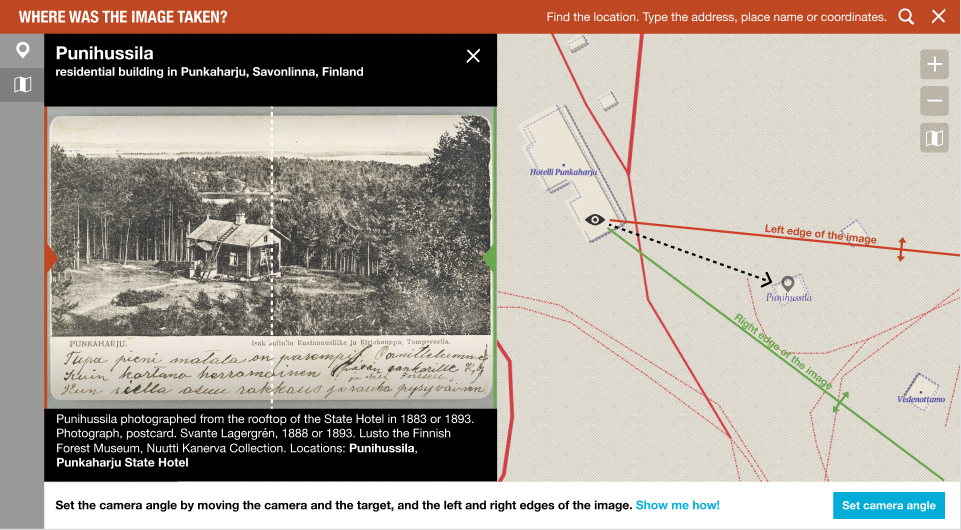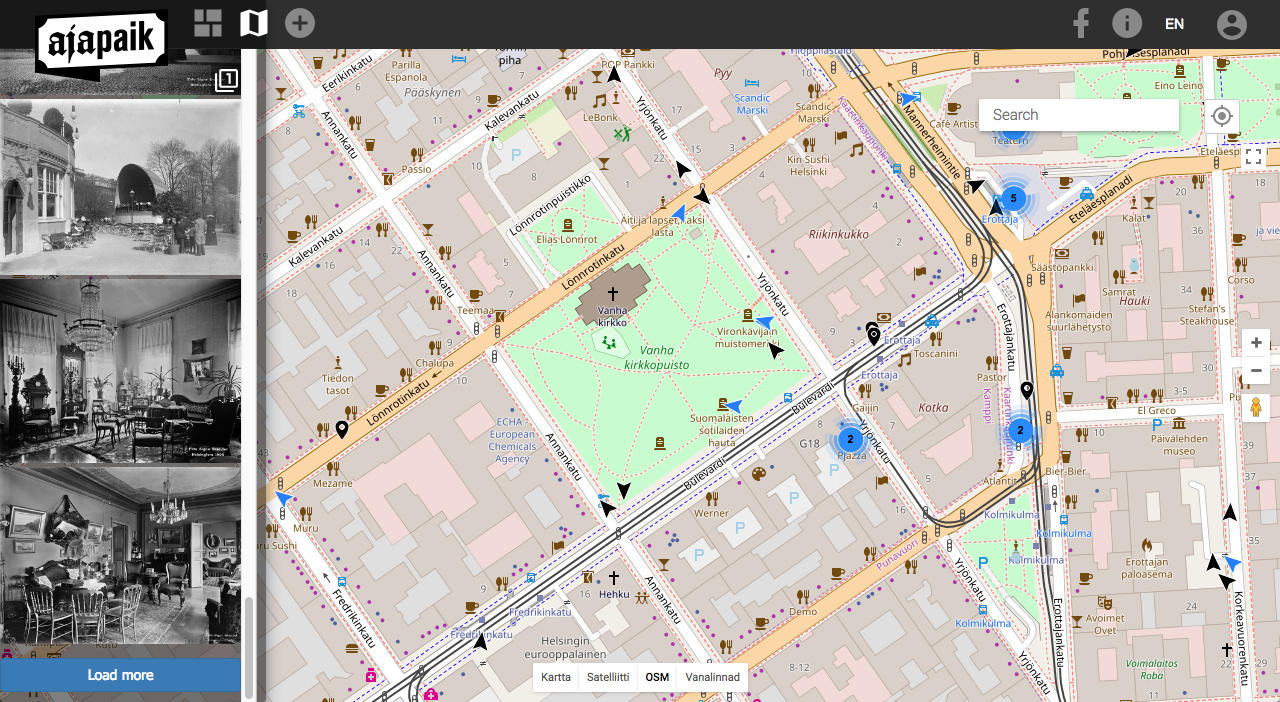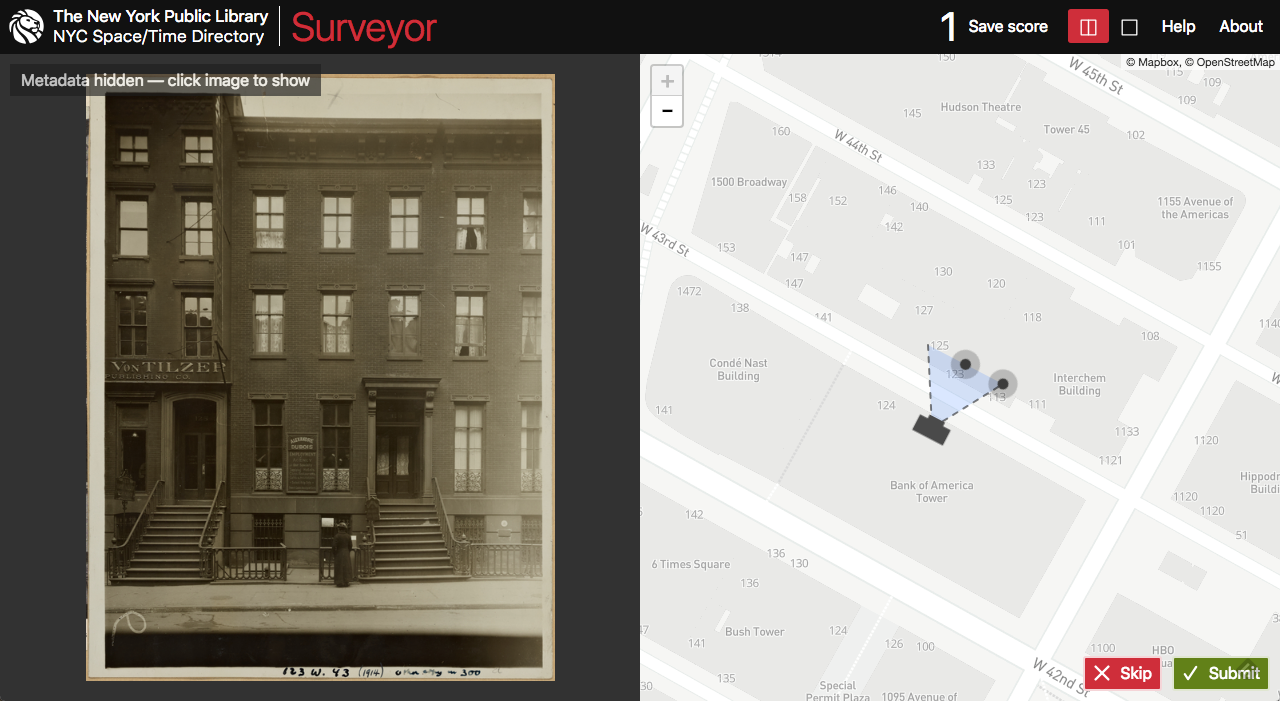Difference between revisions of "Geolocating tool"
(→Step 0: open image) |
(→Enhancement ideas) |
||
| Line 107: | Line 107: | ||
==Storing geotagging data== | ==Storing geotagging data== | ||
The geotagging data is added to the local image metadata. See '''[[Metadata mapping]]''' for details. | The geotagging data is added to the local image metadata. See '''[[Metadata mapping]]''' for details. | ||
| + | |||
| + | ==Seek to the right location== | ||
| + | * The map could seek to a suggested location by parsing the data in the name and description, or existing location information in the image metadata. | ||
| + | * The location links in the image metadata could set the location similarly to actions in the workflow. | ||
==Enhancement ideas== | ==Enhancement ideas== | ||
Revision as of 12:28, 3 January 2019
In Wikidocumentaries all openly licensed images can be geotagged. This is not available for images, whose reuse is restricted.
There will be an internal desktop geolocating tool, and the images can also be rephotographed and geotagged with the Ajapaik mobile app.
Contents
- 1 Accessing the geolocating tool
- 2 The workflow
- 3 Controls
- 4 Storing geotagging data
- 5 Seek to the right location
- 6 Enhancement ideas
- 7 Inspiration
- 8 Navigation
Accessing the geolocating tool
Access to geotagging is available with each image in the images module on the topic page and the image image viewer.
- The most essential metadata of an image is saved into Wikidocumentaries on the moment it is selected for enriching. Any action in the actions menu will make this happen.
Properties added to the image item
- imageURL
- imageHash
The workflow
The geotagging interface is based on the Wikidocumentaries tools layout. It includes a split view of the zoomable image and the zoomable map.
Step 1: Find the main subject
Choose an existing location with the search pulldown (data from Wikidata and Wikidocumentaries).
- Pin: NO pin
- Prompt: "What is the main location depicted in the picture? Search for the topic in the top bar search field."
- Buttons: Skip
- Pulldown: Matches, Create new topic
- Found item
- Found item, topic has coordinates > Step 2.1
- Found item, topic without coordinates > Step 2.2
- Create new topic > Step 3
- Skip > Step 4
- Found item
Step 2: Found item
Step 2.1: Found item, topic has coordinates
- Pin: BLACK pin on the item
- Prompt: "Is the location right? You can tune the coordinates by dragging the pin or search again for another location."
- Item title on top of the image + Button (cross) Remove item (only if you have selected an item.)
- Buttons: Set location
- Move the pin > Step 2.1.1
- Set location > Step 4
- Button (cross) > Step 1
Step 2.1.1: Modify pin location
- Pin: RED pin
- Prompt: "Remember to save when you are done!"
- Buttons: Save location, Cancel
- Save location
- Save coordinate location to the location item in Wikidata
- Save depicts to image item in wikidocumentaries
- > Step 4
- Cancel > Step 2.1
- Save location
Step 2.2: Found item, topic without coordinates
- Pin: RED pin in the middle of the map window
- Prompt: "The topic does not have coordinates yet. Drag the pin to the right location and save the coordinates."
- Item title on top of the image + Button (cross) Remove item
- Buttons: Save location, Skip
- Save location
- Save coordinate location (P625) to the item in Wikidata
- > Step 4
- Skip > Step 4
- Button (cross) > Step 1
- Save location
Step 3: Create new topic=
- Modal: Create new topic modal (label, description, aliases, instance of -pulldown)
- Modal buttons: Create, Cancel
- Create
- Create new item in Wikidata
- > Step 2.2
- Cancel > Step 1
- Create
Step 4: Set camera angle
- Pin: 50% BLACK pin
- Handles: Camera/eye, left edge, right edge, target
- Prompt: "Move the camera and the lines marking the left and right edges of the image to find the most accurate camera angle. The dotted line will help you find what's in the middle of the image. (Show me how)"
- Item title on top of the image + Button (cross) Remove item
- Buttons: Set camera angle
- Show me how > Step 4.1
- Set camera angle
- Save data to the Wikidocumentaries image item:
- > Step 5
- Button (cross) > Step 1
Step 4.1: Show me how modal
Illustration/animation to explain the camera angle thingy
- Modal: Title
- Modal buttons: OK!
- OK > Step 4.
Step 5: Yay! Want to locate another picture?
Controls
- Select background imagery
- The base map (different styles?)
- General map: In Finland the National Land Survey map
- Aerial image: In Finland the National Land Survey aerial imagery
- Map layers
- MapWarper
Storing geotagging data
The geotagging data is added to the local image metadata. See Metadata mapping for details.
Seek to the right location
- The map could seek to a suggested location by parsing the data in the name and description, or existing location information in the image metadata.
- The location links in the image metadata could set the location similarly to actions in the workflow.
Enhancement ideas
Mirror the image
- It may be useful to be able to mirror the image. Would geolocating be a good place for that. Perhaps yes. At what stage?
Adjust left and right edges of the image on the image
Items in the field of view
- The user could select items displayed on the map and equivalent items in the image. The field of view could be adjusted automatically based on that. (There will be an illustration of this).
- The user could verify if POIs that are in the field of view can also be seen on the image. Drag the POIS on the image to right locations.
Display surrounding items
- The user could see items surrounding the found item and change the target by selecting the pin.
3D-view. Elaborating the idea by Matthias Müller-Prove.
- After setting the camera position and the target on the map, the user could fine tune the values in perspective mode:
- Image and map overlaid
- Change the elevation of the image target and the photographer position. Calculate pitch.
- The user could frame the side of a building (or other object: street, pond, statue...) in the image and locate the equivalent on the map. This could give an estimation of the photographer's position.
Crowdsourcing workflows.
- We can also contribute to a standardised exchange format for geotagged photos.
Importing to Wikimedia Commons
- The original image, the image metadata and the added geolocation will be imported to Wikimedia Commons either manually immediately or as a scheduled bot task later.
- Task: Ensure equivalent properties in SDC.
- The original memory institution will be able to read the enhanced data from Wikimedia Commons.
- Task: Investigate best practises.
Inspiration
Ajapaik web app
| About | Technology | Design | Content modules | Tool pages | Projects |
| Status
Wikidocumentaries Slack |
Setting up dev environment |
Components |
Active modules Module ideas |
Visual editor | Central Park Archives |
